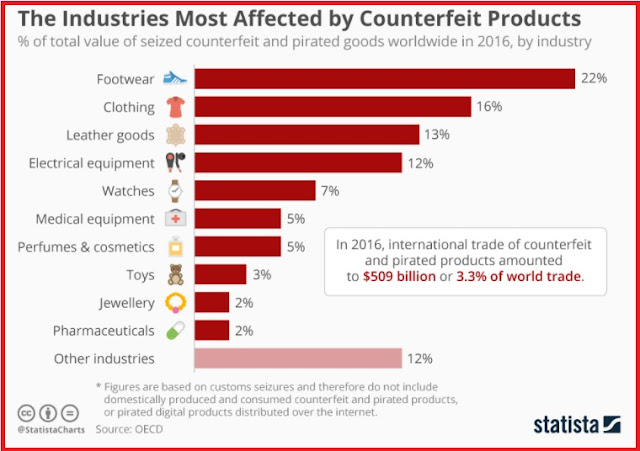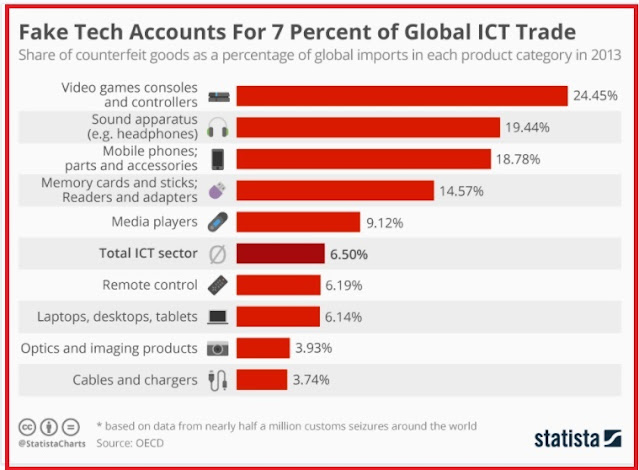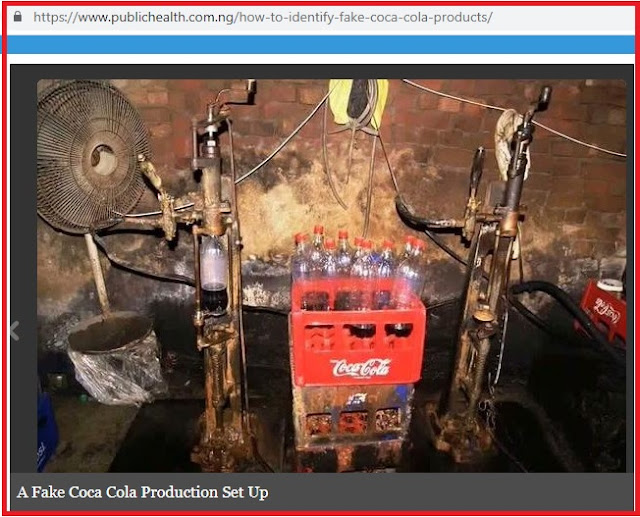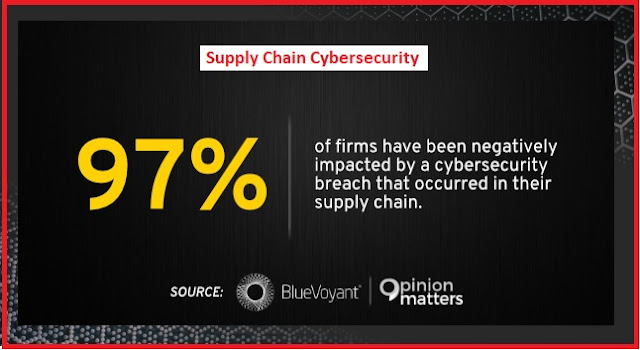Peopled with plausibly 200 million people, Nigeria is the most populous country in Africa. With a total GDP of $432.3 billion, Nigeria is the biggest economy and market in Africa. Nigeria accounts for 82% of Africa’s ICT market and 29% of Africa’s Internet usage. Looks like good news. However, the snag is that there’s patent proliferation of counterfeit products in Nigeria and there’s no guarantee that the product (especially luxury goods) you purchased is genuine. Counterfeiting is not only a Nigerian problem, but also a global malaise. To put things in perspective, in Fiscal Year 2020, the Department of Homeland Security reportedly seized over 26,000 shipments of counterfeit goods valued at over $1.3 billion at United States borders. As a matter of fact, the American multinational e-commerce and one of the world's most valuable brand, Amazon’s anti-counterfeiting efforts reportedly led to the blocking of more than 10 billion suspected phony listings in 2020. Similarly, in addition to erasing 74 cybercrime groups with 385,000 members selling passwords, credit cards and hacking services, Facebook (now Meta) said it proactively removed 283 million pieces of Facebook content violating counterfeit or copyright infringement rules and about 3 million on Instagram. According to European Union's law enforcement agency, Europol, 86% of all counterfeits worldwide originated from Mainland China and Hong Kong in 2015.
This writeup explores the pervasive trend in counterfeiting,
brand protection, intellectual property theft, and supply chain security and
their consequences especially in this age of e-commerce, disinformation, internet
of things, IoT. An attempt is also made to proffer solutions and recommend best
practices, to aforesaid infractions.
Factors Driving Counterfeiting in Nigeria
According to Nigeria’s National Bureau of Statistics
(NBS) 2019 report, 40
percent of the country’s total population, or almost 83 million people, live
below the country’s poverty line of N137,430
naira ($381.75) per year. It follows, and this is not extenuating or justifying
a culture of counterfeiting, that many folks who desire quality stuff cannot
afford them hence will likely resort to buying counterfeit products. It is not
just poverty that drives counterfeiting. It can also be caused by corruption
and greed. For instance, the Nigerian National Petroleum Corporation (NNPC) is currently
enmeshed in finger-pointing, and buck-passing over the importation of about 50,000
metric tons (50 million litres) of ‘adulterated’ petrol into Nigeria. It beggars
belief, as reported by the UK Guardian Newspaper, that Petrol sold to Nigeria
from Europe is 'dirtier' than
black market 'bush' fuel refined in the Niger Delta.
Most of the counterfeit goods in Nigeria are smuggled
through the plethora of porous land borders and these costs the country
millions of dollars in revenue. It is commonplace to find
genuine brand of any product side by side with their imitations in Idumota, Oluwole,
Balogun, Ladipo, Jankara, Computer
village Ikeja, Alaba International Market, Westminster in Apapa, Aba New
Market, Ariaria Market,
Nnewi Market, Onitsha Main Market, Sabon Gari in Kano, to mention just a few. For
instance, about 20 per cent of the cigarette market in Nigeria is said to be controlled by
counterfeiters and illicit cigarette dealers. In the West African region,
Guinea Conakry serves as a key transit route and point of entry into Mali,
which provides access for illicit cigarettes (and unfortunately small arms and
light weapons, SALW) to Libya and the rest of North Africa or northern Nigeria
through Niger Republic. Similarly, Benin, Togo (Lomé, Cotonou, and Tema
container ports) are also key points of entry, providing access to Cote
D’Ivoire, Nigeria, Niger, Burkina Faso, and Ghana.
Background on counterfeiting
and intellectual property
While the English word “counterfeiting” only refers to specific cases of
trademark infringement, in practice, the term encompasses any making of a
product which so closely imitates the appearance of the product of another as
to disinform a customer that it is the product of another. Counterfeiting also
pertains to the unauthorized production and distribution of a product that is
protected by other intellectual property rights, such as copyright and
neighbouring rights (Clark, 1997).
According to the World Intellectual Property Organization
(WIPO), Intellectual property (IP) refers to
creations of the mind, such as inventions; literary and artistic works;
designs; and symbols, names and images used in commerce. It follows that Intellectual
property rights are rights conferred by statutes on an individual or a
corporate organization with respect to the product of his or her intellect,
guaranteeing the exclusive control of the misuse of his work for a limited
period.
How Counterfeiters Exploit The Penetration of Social Media,
e-commerce websites
Thanks to the permeation of social media platforms such
as Facebook, Instagram, Twitter, and the rise of third-party sellers and B2B
e-commerce websites like Amazon, eBay, Jumia, Konga, Jiji, amongst others,
counterfeit, and replica versions of everything, from printer ink to drugs are
just a click away. The EUROPOL warned that
counterfeiters exploit fake social media accounts, register fake profiles,
pages containing original brand names to sell and advertise their products. According
to a research, led by social media analytics firm Ghost Data, social media behemoth,
Facebook, Instagram, both owned by Meta, are hotspots for
fake Louis Vuitton, Gucci, Chanel and other luxury brands. It used to be eBay
10 years ago, and Amazon five years ago. Apparently Facebook owner Meta
Platforms is struggling to stop counterfeiters from pushing fake luxury goods
across its social media apps as the company barrels into ecommerce. Between
June and October 2021, there were more than 26,000 active counterfeiters'
accounts operating on Facebook and more than 20,000 active counterfeiters'
accounts on Instagram, up from its count the previous year.
Trying to catch up, Facebook said it removed 283 million pieces of Facebook content violating counterfeit or copyright infringement rules and about 3 million on Instagram, either before they were reported by brands or before they went live. I reckon the trend will quadruple as Meta rolls out various social commerce features that will allow businesses showcase their products and let customers make purchases directly from WhatsApp chat.
Most Counterfeited Luxury, Pharmaceutical Products
Luxury brands tend to be the most counterfeited products
because they are not only more valuable, but they are also sophisticated. This
explains why products like Brioni, Hermès Handbags, Louis Vuitton, Louboutin,
Balenciaga, Prada, Fendi, Salvatore Ferragamo, Givenchy, Alexander McQueen,
Giorgio Armani, Beats by Dre Headphones, Apple brand power adapters, Rolex
watches, are often counterfeited or have replicas. For instance, while a genuine Gucci designer bag sells for
$1,390, its hard to spot counterfeit which is probably made in Aba, Nigeria, will
go for as low as $100. Footwear - Nike and Adidas are said to be one of the
world's most
counterfeited footwear while Samsung is probably the most counterfeited
high-end smartphone brand in the world
Sale of counterfeit pharmaceutical drugs is a pandemic,
big business in Nigeria, nay Africa. The World Health Organization (WHO) asserts that 42%
of all fake medicines reported to them between 2013 and 2017 were from Africa. 70%
of medicines and 99% of medical devices and equipment in Nigeria are reportedly
imported, mostly from China and India.
NAFDAC's director of investigation and enforcement
directorate, Mr. Kingsley Ejiofor reportedly
averred that the agency had in the past three years seized 2 trillion naira
($4.8 billion) worth of counterfeit drugs. Nigeria is said to lose about
N200bn annually to counterfeit medicines. It is believed that imported fake and
substandard drugs in Nigeria come mainly
from India, China, Pakistan, Egypt, and Indonesia.
In 2015, a study published in the American Society of
Tropical Medicine and Hygiene estimated that more
than 122,000 children under the age of five died each year because of
sub-standard anti-malarial drugs in sub-Saharan Africa. As a rule of thumb, antibiotics,
painkillers, weight loss, cancer, corticosteroids, drugs for erectile
dysfunction, Alzheimer, psychiatric, and antiretrovirals for HIV/AIDS, are amongst
the most counterfeited drugs.
Apart from Pharmaceuticals, luxury goods, Intellectual
property, fast moving consumer goods, FMCG, even the Nigerian currency, the
Naira is not left out. The Central Bank of Nigeria, CBN recently revealed that
it discovered
counterfeit notes with a nominal value of N56.83 million in 2020.
Counterfeit ICT, Software, Fast Moving Consumer Goods
(FMCG) in Nigeria
Fake tech reportedly accounts for 7 percent of global ICT
trade. For instance, an astonishing report on
counterfeit ICT goods published by the OECD asserts nearly one in five mobile
phones shipped internationally is said to be fake. In Nigeria, Hewlett Packard (HP)
Printer inks and cartridges are one of the most counterfeited print supplies in
Nigeria. According to HP, approximately 12 million counterfeits and components were seized by local authorities in
partnership with HP's Anti-Counterfeiting
and Fraud (ACF) Program, across
Europe, Middle East, and Africa (EMEA), over five years.
A 2014 study by the Business Software Alliance, BSA,
leading advocate for the global software industry disclosed that
81% of software in Nigeria are fake or pirated. The BSA estimates that the
commercial value of unlicensed software in Nigeria exceeded $287 million in
2013. Buying
counterfeit products may seem cheap at first but pricey in the long run because
counterfeit software are often vulnerable to computer viruses, malware and
hackers.
Sometime in June, 2019, Nigerian police officers arrested
suspects who specialized in the production of fake versions of such drinks as Hennessy Vsop,
Hennessy Xo, Moet Chandon, Jack Daniel, Remy Martins, Red label amongst others.
An unofficial report suggested the
circulation of the fake Coca-Cola products in parts of Nigeria at a point in
time.
The Harmful Impact of Counterfeits on The Economy And
Brands.
There is no gainsaying the fact that the proliferation of
counterfeits, pirated products, and Intellectual property (IP) theft, terribly drains
the global economy, deprives governments of revenues, enables an “underground
economy”, and negatively affects brands.
A 2019 quantitative analysis of the value, scope, and magnitude of world trade in
counterfeit and pirated products estimates that the volume of international
trade in counterfeit and pirated products translates to about USD 464 billion
in that year, or 2.5% of world trade. Similarly, a previous (2016) OECD-EUIPO
studies, estimated that counterfeit and pirated products amounted to 3.3% of
world trade, or USD 509 billion. Aforesaid data stems from customs seizure observations
and doesn’t consider domestically produced and consumed counterfeit and pirated
products; nor do they include pirated digital content on the Internet.
Punishment for
Intellectual Property Theft in Nigeria
In Nigeria,
Intellectual Property Rights is governed by
the Trademarks Act Cap. 436 Laws of the Federation of Nigeria, the Patents
and Designs Act Cap. 344 Laws of the Federation of Nigeria 1990 and the
Copyright Law Cap. 68 Laws of the Federation of Nigeria 1990.
Similarly, the
Nigeria’s Cybercrimes (Prohibition, Prevention, etc.) Act 2015 imposes criminal action for unauthorized usage
of trademark online. Specifically, Section 25 of the Act states that: "A
person who, intentionally takes or makes use of a name, business name,
trademark, domain name or other word or phrase registered, owned or in use by
any individual, body corporate or belonging to either the Federal, State or
Local Government in Nigeria, on the internet or any other computer network,
without authority or right, and for the purpose of interfering with their use
by the owner, registrant or legitimate prior user, commits an offence under
this Act and is liable on conviction to imprisonment for a term of not more
than 2 years or a fine of not more than N5,000,000.00 or both".
Supply Chain: The Cybersecurity Connection
Supply chain security is an element of supply chain
management that focuses on the risk management of external suppliers, vendors,
logistics and transportation. Its goal is to identify, analyze and mitigate the
risks inherent in working with other organizations as part of a supply chain.
Supply chain security involves both physical security relating to products and
cybersecurity for software and services. Supply chain attacks are the hacker's
new favourite weapon. A recent survey by BlueVoyand, of 1,200 Information Technology leaders
in organizations indicates that supply chain breaches impacted 97% of firms in
2020. The European Union Agency for Cybersecurity (ENISA), projected supply
chain attacks to quadruple by the end of 2021 as compared to the previous year. According
to Sonatype's 2020 State of the Software Supply Chain Report, supply chain attacks targeting open-source software
projects are a major issue for enterprises, since 90% of all applications
contain open-source code and 11% of those have known vulnerabilities.
Writing on ''The Power of Anonymity in Supply Chain
Security'', Adrien Gendre submits that ''your supply chain is not a secret''. According to
him, from a company’s website to its social media accounts, the inner workings
of the company are in the public arena—open to exploitation from
cyber-criminals. In other words, cybercriminals don't have to attack a company
directly or physically. In our hyperconnected world where teleworking is the
new normal, hackers can penetrate a company through a vendor or third party
supplier. Classic examples are: The SolarWinds
hack, a “supply-chain” attack on approximately 18,000 purchasers of the
company’s Orion software. Similar to the SolarWinds incident, is the 2021 Microsoft Exchange Server data breach where
attackers exploited zero-day vulnerabilities that could be used to break into
any Exchange servers that were internet-accessible – and steal all the emails
and files stored on them. Aforesaid cyberattacks affected tens of thousands of
other organizations with far-reaching consequences. Also recall that in January 2022, a Chinese hacking group reportedly breached several German pharma and tech firms. According
to the German government, the hack into the networks of service providers and
companies was primarily an attempt to steal intellectual property.
In this light, the US President, Joe Biden recently signed an ambitious Executive Order calling for a complete reformation of supply chain cybersecurity standards throughout US government entities, and the private sector. Experts believe that if not checked, supply chain cyber-attacks could cripple critical infrastructures in the United States. This explains why US tech giants, Microsoft and Google pledged to invest $30 billion over the next five years, develop a new framework to improve the security and integrity of the technology supply chain.
To be continued....
Written by:
©Don Okereke,
A tech-savvy security thought leader, analyst, researcher, writer, content creator, military veteran.
February 19, 2022









4 comments:
Well articulated, and an eye opening write up.
Thanks for the great write up.
-Osegie Douglas.
Border security is a big challenge and I am happy it was captured ("... plethora of porous borders") as a driver of counterfeit in Nigeria. I do hope that the importance of border security is brought to bare in subsequent edition. Thank you for this piece, it is thought provoking!
An eye opener
Post a Comment